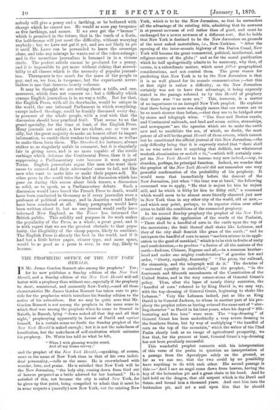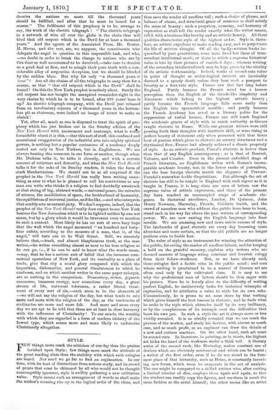THE PROPHETIC OFFICE OF THE NEW YORK HERA LD.
IS Mr. James Gordon Bennett also among the prophets ? Yes ;
for he now publishes a Sunday edition of the New York Herald, and a Sunday edition of the New York Herald will sell better with a prophecy than without one, especially if the prophecy be short, sensational, and eminently New-Yorky,—and all these characteristics Mr. James Gordon Bennett has taken care to pro- vide for the prophecies which introduce his Sunday edition to the notice of his subscribers. But we may be quite sure that Mr. Gordon Bennett is not among the prophets in the same sense in which Saul was among the prophets when he came to Samuel in Naioth, in Resnais, lying "down naked all that day and all that night," prophesying apparently in favour of David and against himself. In a certain sense no doubt the Sunday prophet of the New York Herald is naked enough ; but it is not the nakedness of humiliation, but the nakedness of self-exaltation which animates his prophecy. Dr. Watts has told us what he felt,
"When I with pleasing wonder stand, And all my frame survey
and the prophet of the New York Herald,--apeaking, of course, more in the name of New York than in that of his own indivi- dual personality,—tells us the same. He is overwhelmed with wonder, love, and praise. He is satisfied that New York will be the New Jerusalem, "the holy city, coming down from God out of heaven prepared as a bride adorned for her husband." He is satisfied of this, not because the city is called New York, for he gives up that point, being compelled to admit that it must be in sonic respects a (morally) new New York, not the existing New
I York, which is to be the New Jerusalem, so that he surrenders all the advantage of its existing title, admitting that its newness is at present newness of evil rather than of good, and must be exchanged for a newer newness of a different sort. But he holds that New York is destined to be the New Jerusalem on grounds of the most naked materialism, i.e., New-Yorkism. "After the opening of the inter-oceanic highway of the Darien Canal, New York will become the great commercial, political, intellectual, and religious centre of the globe ;" and as for the moral purification which he half apologetically admits to be necessary, why that, of course, is a subordinate matter, which must follow geographical considerations, and not control them. The great reason for predicting that New York is to be the New Jerusalem is that it is so well placed for its oceanic communication ;—but • this at first sight is rather a difficulty, as the New Jerusalem certainly was not to have that advantage, it being expressly stated in the passage referred to by this Herald of prophecy that there was "no more sea." This, however, is a matter of no importance to an intrepid New York prophet. He explains that there being no more sea simply means that sea routes are to be so much shorter than before,—that they are to be bridged over by steam and telegraph wires. "The Suez and Darien canals, and Continental railroads, and land and ocean cables, steamships, and newspapers" are the agencies which are to make the earth new and to annihilate the sea, of which, no doubt, the most potent of all will be the great Herald of these events, which cannot but be constituted the official journal of this New Jerusalem,—the only difficulty being that it is expressly stated that "there shall in no wise enter into it anything that defileth, nor whatsoever worketh abomination or maketh a lie,"—which will certainly com- pel the New York Herald to become very new indeed,—nay, to abandon, perhaps, its principal function. Indeed, we wonder that the prophet of the New York Herald did not remember one very powerful confirmation of the probability of his prophecy. It would seem that immediately before the descent of the New Jerusalem, just when "the time was at hand," the following command was to apply, "He that is unjust let him be unjust still, and he which is filthy let him be filthy still," a command which would seem to be almost more literally observed just now in New York than in any other city of the world, old or new,— and which may point, perhaps, to its superior claim over other cities to fulfil the conditions of the connected prophecy.
In his second Sunday prophecy the prophet of the New York Herald explains the application of the words of the Psalmist, "There shall be a handful of corn in the earth upon the top of the mountains ; the fruit thereof shall shake like Lebanon, and they of the city shall flourish like grass of the earth ;" and he interprets the handful of corn to mean "modern science in its appli- cation to the good of mankind," which is to be rich in fruits of unity and confederation,—to produce "a fusion of all the nations of the earth—Indians, Chinese, Negroes and all,—in a common brother- hood and under one mighty confederation" of genuine law and order, "liberty, equality, fraternity." "The press, the railroad, the steamship, and the telegraph will do it." The doctrine of "universal equality is embodied," says the prophet, "in the fourteenth and fifteenth amendments of the Constitution of the United States, and is the very corner-stone of General Grant's policy. Thus, after the lapse of nearly thirty centuries, the handful of corn' referred to by King David is, we may say, with the top-dressing of General Grant, beginning to shake like Lebanon." Very like Lebanon indeed, just as like as King David is to General Jackson, to whom in another part of his pro- phecy the prophet refers as having evinced the same sort of "ster- ling character" as David in his later years, when his days of" fill i- bustering and free love" were over. The " top-dressing " of General Grant has been undoubtedly a very severe dressing to the Southern States, but by way of multiplying "the handful of corn on the top of the mountain," which the writer of the 72nd Psalm clearly took as an image of agricultural prosperity, we fear that, for the present at least, General Grant's top-dressing has not been peculiarly successful.
This wonderful prophet connects with his interpretation of this verse of the psalm in question an interpretation of a passage from the Apocalypse solely on the ground, as far as we can see, that the two could by no possibility have anything to do with each other. His second passage is this And I saw an angel come down from heaven, having the key of the bottomless pit and a great chain in his hand. And he laid hold on the dragon, that old serpent which is the Devil and Satan, and bound him a thousand years. And cast him into the bottomless pit, and set a seal upon him that he should
deceive the nations no more till the thousand years should be fulfilled, and after that he mast be loosed for a season." The fulfilment of this prophecy is to be, strange to say, the work of the electric telegraph ! "The electric telegraph in a network of wire all over the globe is the chain that will bind that old serpent which is the Devil for at least a thousand years." And the agents of the Associated Press, Mr. Reuter, M. Haves, and the rest, are, we suppose, the constituents who delegate the angel in question to this responsible task, and who, —no doubt in order to break the change to nations who are by this time so well accustomed to be deceived,—take care to deceive is a good deal at first, and to mingle their pure truth with a con- siderable alloy of serpentine deception, lest we should be blinded by the sudden blaze. But why for only "a thousand years at least"? Are all the chains of all the telegraphs to snap then for a season, so that "that old serpent which is the Devil" shall be loosed? On this the New York prophet is entirely silent. Surely the old serpent has not bought the unexpired remainder-right in the very chains by which he is to be bound, after 999 years' lease is up? An electric telegraph company, with the Devil just released from an involuntary sojourn of a thousand years in the bottom- less pit as chairman, were indeed an image of terror to make us shrink !
Yet, after all, much as one is disposed to treat the spirit of pro- phecy which has just broken out in the Sunday edition of the New York Herald with amusement and contempt, what is rettily formidable about it is this,—that this sort of stuff, this confused and sensational exaggeration of the industrial arts into mighty spiritual powers, is nothing but a popular caricature of a tendency deeply rooted not only in New Yorkers, but in Englishmen. We are always hearing this nonsense in one form or another, though when Mr. Dickens talks it, he talks it cleverly, and with a certain amount of reticence and dexterity, and when the New York Herald talks it for the sake of its Sunday readers, it takes the form of stark Manhattanism. We should not be at all surprised if the prophet in the New York Herald has really been writing some- thing as near to what he is pleased to call his convictions as any man can write who thinks it a religion to feel decidedly awestruck at that string of big, abstract words,—universal peace, the miracles -of science, the annihilation of space, the brotherhood of humanity, the equilibrium of universal justice, and the like, —and who interprets that muddy awe as natural piety. We don't suppose, indeed, that the prophet of the New York Herald really does expect to see New York become the New Jerusalem which is to be lighted neither by sun nor moon, but by a glory which it would be irreverent even to mention in such a context. Most likely he has no sort of even hazy hope that the Wall which the angel measured "an hundred and forty- four cubits, according to the measure of a man, that is, of the angel," will turn out to be Wall Street. Still, we sincerely ebelieve that,—trash, and almost blasphemous trash, as the man writes,—he writes something almost as near to his true religion as -be can go, i.e., if he can be said to know what the words mean, —nay, that he has a serious sort of belief that the immense com- mercial operations of New York, and its centrality as a place of trade, give that city a moral glory compared with which the impurities, dishonesties, and general dissoluteness to which he -confesses, and on which another writer in the same paper enlarges, are as nothing in the comparison. Democracy, riches, gigantic -commerce, immense energy, new sensations every day, a great stream of life, universal tolerance, a rather liberal treat- ment of every sort of sin,—such seem to be the elements of —we will not say the religion of the day, but what tends to mix enore and more with the religion of the day, as the tendencies of civilization are more and more felt. And more and more every day we are apt to be told that these are at least in close harmony with the influences of Christianity ! To our minds, the worship with which they are regarded is a form of modern idolatry of the lowest type, which seems more and more likely to undermine Christianity altogether.











































 Previous page
Previous page